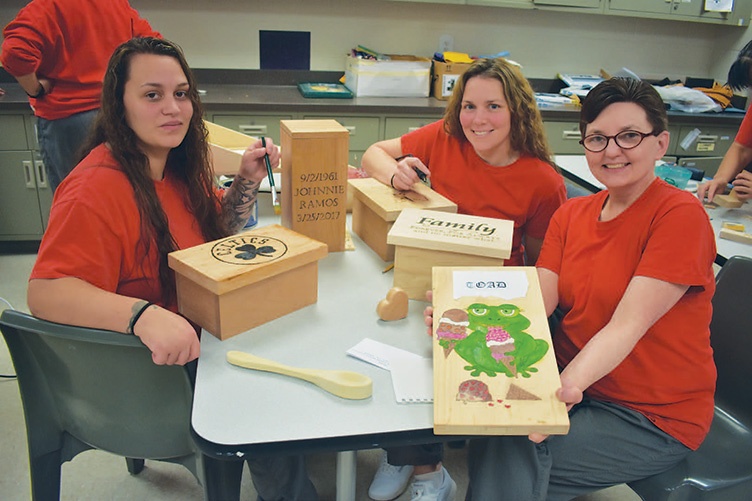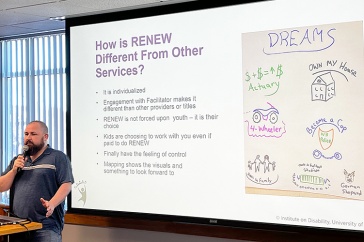
Women in the Prison Outreach Program at the women's prison in Concord, New Hampshire (courtesy photo, approved for use by residents and the State).
NH Furniture Masters Annual Prison Outreach Exhibition
The Concord exhibition, which runs through January 6, 2023, features woodwork created in the Concord, New Hampshire, and Warren, Maine, men’s prisons. This year, the work produced in the Concord women’s prison is included.

Carving a spoon was the first project. The women were each given a block of basswood and a gouge. After some basic instructions, they set to it. It’s a simple project that gets materials into students’ hands quickly so they start to get the feel of woodworking.
That was a little over a year ago, when Leah Woods, associate professor of art in woodworking and furniture design, launched a 12-week woodworking course in the New Hampshire Correctional Facility for Women in Concord, New Hampshire. This month, she’s started her fourth run of the course.
Woods is part of New Hampshire Furniture Masters, a professional group for furniture makers. That group has been running a woodworking Prison Outreach Program (POP) in the men’s prison in Concord for over 20 years and another in Warren, Maine, for over 10, with the goal of rehabilitation and reduced recidivism. The programs have been wildly popular and successful. During its first 14 years, the period for which information is available, no one who participated in the Concord program returned to prison.
But what about incarcerated women? For much of the 20th century, most women convicted of felonies in New Hampshire weren’t housed in the State. Class action litigation in 1989 resulted in a “temporary” facility for women in Goffstown. It wasn’t until 2018 — 29 years later — that the new women’s prison in Concord opened its doors, with space and resources to provide more opportunities for women to access education and training.
It was then that Woods, with Furniture Masters colleagues Lynn Szymanski and Mary McLaughlin, started planning a woodworking POP in the women’s prison.
The Why of Woodworking
Carving a spoon allows a student to “do” woodworking right away. That was important for Woods, who realized almost immediately that her POP students — between seven and ten per course — weren’t interested in philosophizing about woodworking or even talking about job-training. They wanted to create.
Soon, they moved from spoons to hinged boxes, book ends and plaques. All the work is highly personal, intended for loved ones and mailed off as soon as ready.
“One of the things I was unprepared for” says Woods, “is the content that the women would bring into the work. Every project that every person has made has been dedicated to her mother, her husband, her children or her bestie, with intensely personal affirmations.”

That surprise figures into questions Woods asks herself about the goal of the program: what do the women want and how will Woods, herself, define success?
In contrast to the residents in the men’s prisons who are serving sentences ranging from 10 to life, many of the women at the prison are serving much shorter sentences. Woods and her colleagues understand that what motivates people incarcerated for life might be very different from those with lesser sentences. Because job training could be an incentive and benefit for the women, they are working on developing pathways to woodworking apprenticeships that women can complete upon release. But, Woods admits, it’s not clear how many would be interested in such an opportunity.
“My goal is not necessarily to have anybody want to come out of this program a woodworker,” says Woods, “because I feel like there are so many benefits to it in terms of personal engagement." Woodworking can build self-esteem and confidence, she says.
The Woodshop
Wednesday nights, Woods and the women gather in a classroom that, by day, is used for the prison’s cosmetology school. They sign out gouges, chisels, sanders and a few other hand tools from a corrections officer. They have a jigsaw, but there are no bandsaws, lathes, planers or grinders. Without more tools, the women’s work can only progress so far.
“One of the concerns I have had over this past year is that the women would begin to lose excitement for this new skill because of the facilities,” says Woods.
Szymanski and McLaughlin have been fundraising to purchase more supplies and equipment for the program, but with facilities unable to accommodate the expansion, they began looking into the possiblity of finding a dedicated woodshop. The Furniture Masters group has been working with the State to build one.
Woods and her colleagues now have the support of Department of Corrections Commissioner Helen Hanks, Governor John Sununu and several state legislators for a new trades building to house three prison industries: carpentry, electric and plumbing. It will be small structure, but a great step up for the program.
In order for the State to financially back the trades building, Woods assumes the new industries will need to provide revenue to offset costs.

“It seems reasonable to think that if we had a fully equipped woodshop, we could have a cabinet-making shop where the women could make furniture, both higher end and lower end, full time, 9-5.”
The residents would earn a small hourly wage but learn a trade in the process. They could then progress from boxes to learning the fine art skills that the men’s prisons have been developing for decades.
For the Love of Teaching
For every project the women undertake in the woodshop, Woods selects and preps the wood ahead of time. Between classes, she helps with projects and prepares lesson plans, spending her Wednesday nights at the prison. It’s a lot of work beyond her commitments as a professor at UNH.
She says it has been extremely rewarding.
“I love to teach,” Woods says, “so I enjoy that actual experience of being in the classroom with the residents. The women come into the classroom with a strong desire to be there. Even when they are not working, they are still ‘present’ and helping each other.” She’s been impressed and inspired by the women’s joyful enthusiasm.
And Woods wants to give back. It’s one of the reasons why she co-developed the women’s POP.
“I have felt very lucky for the opportunities I've been given and the older I get, the more I become aware of how arbitrary life is in terms of what families and opportunities people are born into.”
-
Written By:
Susan Dumais '88 '02G | College of Liberal Arts
















































